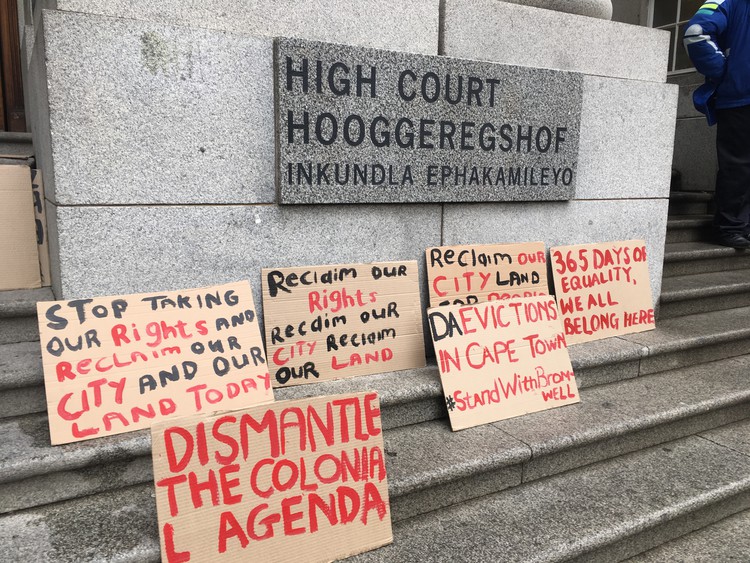
24 November 2020
A three-day court hearing to determine the legality, or otherwise, of evicting “land invaders” began in the Western Cape High Court on Tuesday. Archive Photo: Ashley Furlong
A three-day court hearing to determine the legality, or otherwise, of evicting “land invaders” began in the Western Cape High Court on Tuesday.
In August judges Shehnaz Meer and Rosheni Allie ruled that the City of Cape Town’s Anti-Land Invasion Unit (ALIU) cannot evict people or demolish their structures, whether occupied or unoccupied, without a court order while the country remains in a state of national disaster.
And even if there was a court order, officials had to act in a humane and dignified way, the judges said.
The applicants – the South African Human Rights Commission (SAHRC) and several intervening parties – now want the urgent order granted to be made final, and to extend beyond the state of national disaster.
The matter arose after a video, which the judges described in their initial ruling as “shocking”, of a naked Bulelani Qolani being dragged from his shack in an informal settlement by a City official was widely shared on social media. His structure and those of his neighbours were then torn down.
The City claimed it was entitled to act without a court order, because the structures were “unoccupied”.
Reacting to the ruling at the time, Mayor Dan Plato said it set a “dangerous precedent making it almost impossible for landowners to protect their property”. “The knock-on effect of the large-scale orchestrated land invasions we have seen is simply devastating for Cape Town, its communities, residents in general and the city,” he said.
Several other parties have now joined in the legal skirmish which will probably end up at the Constitutional Court.
One is the Western Cape Government, in support of the City, which has made submissions regarding consequences “when tools to intervene in large-scale land invasions are taken away”. Provincial Minister of Human Settlements Tertius Simmer says: “The common law remedy of counter-spoliation, which recognises an owner’s right to immediately retake possession of unlawfully-taken property, without approaching a court first, is a vital means by which violent and often orchestrated invasion of our land is avoided.”
While acknowledging the desperate need for housing, he said funds used to stop illegal land invasions would be better spent creating housing opportunities in a lawful manner for those registered on waiting lists.
Shack dwellers movement Abahlali baseMjondolo, represented by the Socio-Economic Rights Institute (SERI), argues that permitting controlled occupation of land by people who would otherwise have nowhere else to go has to be part of any reasonable housing policy; more so when the government admits that it cannot meet the demand and it may take up to 70 years before everyone has a home.
“The City may well be within its rights to repel a group of people who are trying to take occupation of RDP housing units meant for others. But it is not constitutionally entitled to summarily demolish structures on its land, or to expel the people who have built those structures because they have no other accommodation available to them.
“The very least the City must do in these circumstances is ask a court to authorise their removal, after an examination of the facts of the particular land occupation at issue.
“There is an indisputable truth: those people will have to live somewhere. At least some of them will be driven to occupy vacant land because they have no other option available to them. “
Much of the first day of the hearing was taken up by argument over whether or not Afriforum should be admitted, belatedly, as a friend of the court.
Afriforum argued that it wanted to represent the interests of private land and property owners who would be impacted if counter-spoliation were ruled to be unconstitutional, because unlike government they did not have deep financial pockets to apply for court orders.
It also argued that the “novelty” of their argument included the fact that the invasion of a person’s house or land could lead to them becoming homeless as a result, which was not the case for the government respondents.
The EFF, which has also joined the case, argued that these issues were “entirely irrelevant” to the outcome of the case.
The judges ruled that all the issues Afriforum wanted to raise had already been raised by the City and the province and the court was already cognisant that the effect (of any ruling) might be experienced differently by the state and private landowners.
Argument is continuing and judgment is expected to be reserved.